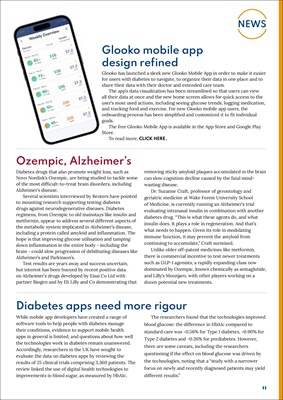
11
NEWS
Ozempic, Alzheimer's
Diabetes drugs that also promote weight loss, such as
Novo Nordisk's Ozempic, are being studied to tackle some
of the most difficult-to-treat brain disorders, including
Alzheimer's disease.
Several scientists interviewed by Reuters have pointed
to mounting research supporting testing diabetes
drugs against neurodegenerative diseases. Diabetes
regimens, from Ozempic to old mainstays like insulin and
metformin, appear to address several different aspects of
the metabolic system implicated in Alzheimer's disease,
including a protein called amyloid and inflammation. The
hope is that improving glucose utilisation and tamping
down inflammation in the entire body - including the
brain - could slow progression of debilitating diseases like
Alzheimer's and Parkinson's.
Test results are years away and success uncertain,
but interest has been buoyed by recent positive data
on Alzheimer's drugs developed by Eisai Co Ltd with
partner Biogen and by Eli Lilly and Co demonstrating that
removing sticky amyloid plaques accumulated in the brain
can slow cognition decline caused by the fatal mindwasting
disease.
Dr. Suzanne Craft, professor of gerontology and
geriatric medicine at Wake Forest University School
of Medicine, is currently running an Alzheimer's trial
evaluating intranasal insulin in combination with another
diabetes drug. "This is what these agents do, and what
insulin does. It plays a role in regeneration. And that's
what needs to happen. Given its role in modulating
immune function, it may prevent the amyloid from
continuing to accumulate," Craft surmised.
Unlike older off-patent medicines like metformin,
there is commercial incentive to test newer treatments
such as GLP-1 agonists, a rapidly expanding class now
dominated by Ozempic, known chemically as semaglutide,
and Lilly's Mounjaro, with other players working on a
dozen potential new treatments.
Glooko mobile app
design refined
Glooko has launched a sleek new Glooko Mobile App in order to make it easier
for users with diabetes to navigate, to organize their data in one place and to
share their data with their doctor and extended care team.
The app's data visualization has been streamlined so that users can view
all their data at once and the new home screen allows for quick access to the
user's most used actions, including seeing glucose trends, logging medication,
and tracking food and exercise. For new Glooko mobile app users, the
onboarding process has been simplified and customized it to fit individual
goals.
The free Glooko Mobile App is available in the App Store and Google Play
Store.
To read more, CLICK HERE.
Diabetes apps need more rigour
While mobile app developers have created a range of
software tools to help people with diabetes manage
their conditions, evidence to support mobile health
apps in general is limited, and questions about how well
the technologies work in diabetes remain unanswered.
Accordingly, researchers in the UK have sought to
evaluate the data on diabetes apps by reviewing the
results of 25 clinical trials comprising 3,360 patients. The
review linked the use of digital health technologies to
improvements in blood sugar, as measured by HbA1c.
The researchers found that the technologies improved
blood glucose: the difference in HbA1c compared to
standard care was -0.56% for Type 1 diabetes, -0.90% for
Type 2 diabetes and -0.26% for prediabetes. However,
there are some caveats, including the researchers
questioning if the effect on blood glucose was driven by
the technologies, noting that a "study with a narrower
focus on newly and recently diagnosed patients may yield
different results."